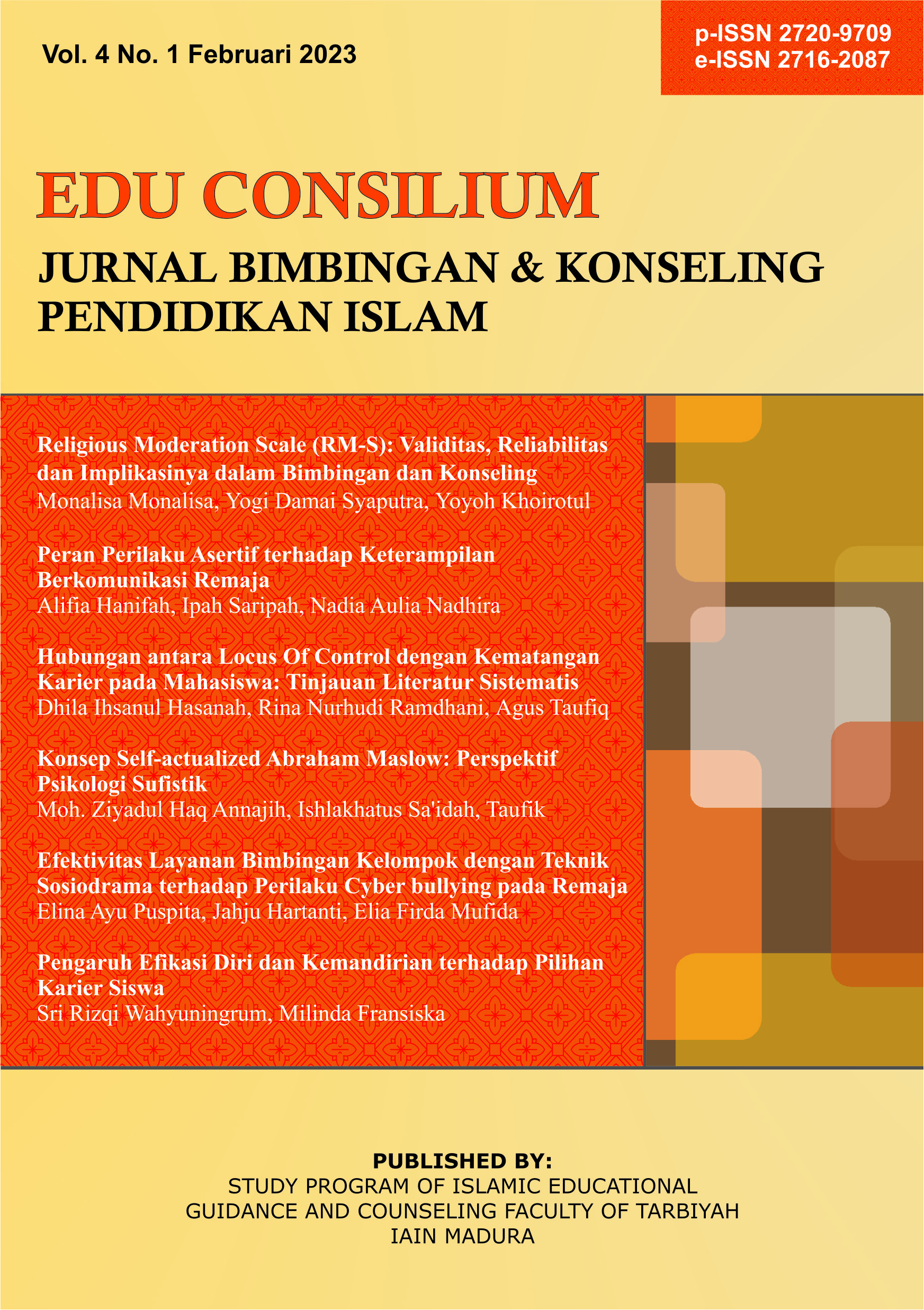Hubungan antara Locus Of Control dengan Kematangan Karier pada Mahasiswa: Tinjauan Literatur Sistematis
 Abstract views: 1221
,
Abstract views: 1221
,
 PDF downloads: 1540
PDF downloads: 1540
Abstract
The large number of students who have not been able to decide what career choices they will pursue after graduating from university, as well as the high number of unemployed graduates, one of which is the background of their low career maturity. One of the factors that influence career maturity is locus of control. Locus of control describes how far the individual views his confidence in the efforts he makes to achieve a career. This study aims to describe the relationship between locus of control and career maturity in college students. This study uses a systematic literature review method with PRISMA guidelines. The data used is a collection of articles about locus of control and career maturity in students. The data comes from searching articles on the Google Scholar and Crossref databases with the help of the Publish or Perish (POP) application. The article search strategy uses keywords according to topics from the last 10 years, namely 2012-2022. The articles were screened and an assessment of the feasibility of the journal was carried out according to the inclusion and exclusion criteria. This study uses 6 main articles. The results showed that there was a significant relationship between internal locus of control and career maturity in college students. That is, the higher the student's internal locus of control, the higher the career maturity of the student.
Downloads
References
Abidin, J., & Fitriyah, U. (2017). Pengaruh locus of control terhadap kematangan karir mahasiswa fakultas agama islam. Jurnal Pendidikan Pascasarjana Magister PAI, 2(1), 158–167. https://journal.unsika.ac.id/index.php/pendidikan/article/view/1041/851
Amalia, I. (2020). Hubungan Lokus Kendali Internal dengan Kematangan Karir Pada Mahasiswa Psikologi Universitas Malikussaleh. Jurnal Psikologi Terapan (JPT), 1(1), 12. https://doi.org/10.29103/jpt.v1i1.2870
Atmoko, A., Konseling, B., Pendidikan, F. I., & Malang, U. N. (2020). 4429-Article Text-11309-1-10-20210320. 2(1), 1–17. https://doi.org/10.1905/ec.v1i1.1808
Badan Pusat Statistik. (2021). Pengangguran Terbuka Menurut Pendidikan Tertinggi yang Ditamatkan. [Online]. Diakses dari https://www.bps.go.id/indicator/6/674/1/-pengangguran-terbuka-menurut-pendidikan-tertinggi-yang-ditamatkan.html
Crites, J. O. (1981). Career Counseling: Models, Methods, and Materials. New York: McGraw Hill.
Coertse, S., & Schepers, J. M. (2004). Some Personality and Cognitive Correlates of Career Maturity. SA Journal of Industrial Psychology, 30 (2), 56-73.
El Hami, A., Zahroturrosyida, H., & Mariana, S. (2006). Gambaran Kematangan Karier Pada Para Calon Sarjana Di Lingkungan Fakultas Psikologi Universitas Padjajaran. Laporan Penelitian, 1-35.
Feist, J. & Gregory J. Feist. (2010). Teori Kepribadian (Edisi ketujuh). Jakarta: Penerbit Salemba Humanika.
González, M. Á. (2008). Career maturity: A priority for secondary education. Electronic Journal of Research in Educational Psychology, 6(16), 749–772.
Greenhaus, J. H., & Callanan, G. A. (Eds.). (2006). Encyclopedia of Career Development. California: Sage Publications.
Hamzah, A. (2019). Kematangan Karir. Malang: Literasi Nusantara.
Hidayat, H., Tamin, B. Y., Herawati, S., Ardi, Z., & Muji, A. P. (2020). The Contribution of Internal Locus of control and Self-Concept to Career Maturity in Engineering Education. Int. J. Adv. Sci. Eng. Inf. Technol, 10(6), 2282-2289. DOI: https://doi.org/10.18502/kss.v3i15.4370
Hurlock, E. B. (1980). Psikologi Perkembangan. Jakarta: Erlangga.
Iskandar, & Anggraeni, D. (2022). Pengaruh Internal Locus of Control , Konsep Diri , Dan Dukungan Keluarga Terhadap Kematangan Karir. Equilibrium: Jurnal Penelitian Pendidikan Dan Ekonomi, 19(01), 113–117.
Istiqlailia, N & Sa’idah, I. (2021). Hubungan Antara Self Efficacy Dengan Pengambilan Keputusan Karier Pada Siswa Kelas XII Putri MA Miftahul Qulub Galis Pamekasan. Edu Consilium: Jurnal Bimbingan Dan Konseling Pendidikan Islam, 2(2), 1–10. https://doi.org/10.19105/ec.v2i2.4937
Kamil, B., & Daniati, D. (2017). Layanan Informasi Karir dalam Meningkatkan Kematangan Karir pada Peserta Didik Kelas X Di Sekolah Madrasah Aliyah Qudsiyah Kotabumi Lampung Utara Tahun Pelajaran 2016/2017. KONSELI : Jurnal Bimbingan Dan Konseling (E-Journal), 3(2), 185–196. https://doi.org/10.24042/kons.v3i2.565
Kreitner, & Kinicki. (2001). Organizational Behavior. Fifth Edition. Irwin Mc.Graw-Hill.
Kreitner, R & Kinichi, A. (2003). Perilaku Organisasi. Edisi Pertama. Jakarta: Salemba Empat.
Kurniawati, H. (2021). The effect of future time perspective, emotional intelligence and peer support on career maturity in students. Jurnal Konseling Dan Pendidikan, 9(3), 304–314.
Nashriyah, S. Q., Yusuf, M., & Karyanta, N. A. (2014). Hubungan antara penyesuaian diri dan dukungan sosial keluarga dengan kematangan karir pada mahasiswa program studi ilmu komunikasi FISIP UNS. Jurnal Ilmiah Psikologi Candrajiwa, 2(5), 195–205. http://candrajiwa.psikologi.fk.uns.ac.id/index.php/candrajiwa/article/view/72
Nugraha, B. A. (2018). Problem Penentuan Karir Mahasiswa Tingkat Akhir (Studi pada Mahasiswa Bimbingan dan Konseling IAIN Batusangkar). Skripsi. Institut Agama Islam Negeri Batusangkar.
Nurillah, S. L. (2017). Program Bimbingan Karier untuk Meningkatkan Kematangan Karier Mahasiswa. Journal of Innovative Counseling: Theory, Practice, and Research, 1(01).
Nuryatin, A. (2016). Analisis Kematangan Karier Mahasiswa Ditinjau dari Self Efficacy dan Locus of control. Equilibrium: Jurnal Penelitian Pendidikan dan Ekonomi, 14.
Osipow, S. H. (1983). Theories of Career Development (3rd ed). New Jersey: Prentice-Hall International Inc.
Permatasari, S. D. (2020). Influence of Locus of control, Self Efficacy, and Career Guidance on Students Career Maturity in Jakarta. Journal Economic Education, Office Administration & Accounting.
Rotter, J. (1966). Generalized Expectancies for Internal Versus External Control of Reinforcements. Psychological Monographs: General and Applied. 80, 1-28. DOI: https://doi.org/10.1037/h0092976
Santrock, J. W. (2011). Life Span Development, 13th ed. Jakarta: Erlangga.
Seligman, L. (1994). Developmental Career Counseling & Assesment (2nd ed). California: SAGE Publications.
Sharf, R. S. (1992). Applying Career Development Theory to Counseling. California: Pasivic Grove.
Siregar, M. (2015). Hubungan locus of control internal dengan kematangan karir pada siswa SMKN 1 Percut Sei Tuan. Jurnal Diversita, 1(1), 29–33.
Smet, B. (1994). Psikologi Kesehatan. Jakarta: Grasindo.
Suherman, U. (2013). Bimbingan dan Konseling Karir: Sepanjang Rentang Kehidupan. Bandung: Rizki Press.
Super, D. E. (1975). The Psychology of Career: An Introduction Vocational Development. New York: Harper.
Triandini, E., Jayanatha, S., Indrawan, A., Putra, G. W., & Iswara, B. (2019). Metode Systematic Literature Review untuk Identifikasi Platform dan Metode Pengembangan Sistem Informasi di Indonesia. IJIS: Indonesian Journal of Information Systems, 1(2), 63–77. DOI: https://doi.org/10.24002/ijis.v1i2.1916
The journal operates an Open Access policy under a Creative Commons Non-Commercial 4.0 International license. Authors who publish with this journal agree to the following terms:
- Authors retain copyright and grant the journal right of first publication with the work simultaneously licensed under a
 Commons Attribution-NonCommercial 4.0 International License
Commons Attribution-NonCommercial 4.0 International Licensethat allows others to share — copy and redistribute the material in any medium or format, and adapt — remix, transform, and build upon the material.
- Authors are able to enter into separate, additional contractual arrangements for the non-exclusive distribution of the journal's published version of the work (e.g., post it to an institutional repository or publish it in a book), with an acknowledgement of its initial publication in this journal.
- Authors are permitted and encouraged to post their work online (e.g., in institutional repositories or on their website) prior to and during the submission process, as it can lead to productive exchanges, as well as earlier and greater citation of published work (see The Effect of Open Access).




















